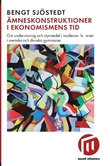onr:"swepub:oai:DiVA.org:mau-7466"
Sökning: onr:"swepub:oai:DiVA.org:mau-7466" > Ämneskonstruktioner...
- 1 av 1
- Föregående post
- Nästa post
- Till träfflistan
Ämneskonstruktioner i ekonomismens tid : Om undervisning och styrmedel i modersmålsämnet i svenska och danska gymnasier
-
- Sjöstedt, Bengt (författare)
- Malmö högskola,Institutionen för kultur, språk och medier (KSM)
- (creator_code:org_t)
- ISBN 9789171045157
- Malmö högskola, Fakulteten för lärande och samhälle, 2013
- Svenska 480 s.
- Serie: Malmö Studies in Educational Sciences, 1651-4513 ; 70
- Doktorsavhandling (övrigt vetenskapligt/konstnärligt)
Abstract
Ämnesord
Stäng
- Under vilka villkor formar en dansklärare och en svensklärare sin pedagogiska gärning? Utifrån vilka ideal och organisatoriska förutsättningar möter de sina elever? Bengt Sjöstedt presenterar i denna doktorsavhandling i svenska med didaktisk inriktning sina svar på dessa frågor. Till grund för hans slutsatser ligger omfattande studier av undervisningen i skolämnena danska och svenska i gymnasiemiljöer i Danmark respektive Sverige. Hans undersökningar av den faktiska undervisningen tillsammans med studier av internationell forskning om skolan och dess styrsystem resulterar i en tankeväckande bild av den pedagogiska praktik lärarna har möjlighet att utveckla. Sjöstedts jämförande studie är den första i sitt slag och skapar därmed nya förutsättningar för fortsatt samtal på nordisk nivå om de framtida villkoren för de nordiska modersmålen.
- A comparison is drawn between the subjects of Swedish and Danish at 'gymnasium' level (upper secondary school) in the two countries, and of the governing documents, governing systems, and international trajectories behind them. The thesis is grounded in Basil Bernstein's didactic model and his recontextualisation model, in Danish didactic theories, and in Swedish curriculum theory. Both the Danish didactic theories and Bernstein's recontextualisation model are expanded to include a governing system level and a global level. Through a meta-analysis it is shown that four different constructions of a mother tongue subject can be made. At c1assroom level (the pedagogic reproduction discourse level) substantial differences were traced concerning teachers' choices of texts; the Swedish teachers chose texts they thought would interest their students, whereas the Danish teachers chose texts that were challenging with regard to both content and form. Furthermore, texts were treated differently: the Swedish students reflected on ethical and societal issues suggested by the text, while the Danish students analysed, interpreted and put the text itself into perspective. Thus, individualism and students' learning responsibility were the codes and determinants identified in the Swedish classrooms; subject knowledge and cultural formation in the Danish classrooms. Consequently, the subject of Swedish was defined as liberal/progressive with an invisible pedagogy, white the subject of Danish was defined as a (subversive) cultural formation subject with a visible pedagogy. The Swedish governing documents (the official pedagogic discourse), analysed with the help of SFL, stress individualism, students' learning responsibility, ethical values, and ambiguity. The Danish curricula highlight the individual in society, cultural formation, subject knowledge, and explicitness. The governing system (the official recontextualisation field) in Sweden demands decentralisation, interdisciplinary co-operation, choice, individualism and minimal ism; in Denmark the corresponding tenets are centralisation, subject orientation, and an official examination system. Accordingly, the Swedish structures of subject construction, codes and determinants generate an invisible pedagogy, while the Danish ones generate a visible pedagogy. In the global recontextualisation field the governing trajectories of economism (New Public Management) are globalisation, invisibility, newspeak, decentralisation, competition/ privatisation/choice, individualism, control/performativity/responsibility, accountability, and minimalism/effectiveness/productivity. Many of these terms coincide with the codes and determinants of the Swedish classrooms, governing documents, and governing system. The study shows that the Swedish educational system is infused by economic ideas in the official recontextualisation field, white this has not been the case in Denmark, at least not to the same extent. In Bernstein's model the pedagogical recontextualisation field (here called the discussion arena) is part of the official recontextualisation field. In my revised model, however, it is a field in its own right. Important agents at this level are teacher training institutions, subject teachers’ associations, trade unions, employers' associations, and two Ministers of Education. Finally, it is shown how the various levels of governing 'gymnasium' education influence teachers working conditions, salaries, headmasters' roles, privatization/competition, parents' and students' demands and teachers' autonomy.
Nyckelord
- subject constructions
- governing system
- governing document
- subject of Swedish
- subject of Danish
- recontextualisation
- frame factors
- codes
- determinants
- subject didactics
- Basil Bernstein
- economism
- new public management
- trajectories
- the teching and learning of Swedish
- educational sciences
Publikations- och innehållstyp
- vet (ämneskategori)
- dok (ämneskategori)
Hitta via bibliotek
- Ämneskonstruktioner i ekonomismens tid Om undervisning och styrmedel i modersmål... (Sök publikationen i LIBRIS)
Till lärosätets databas
- 1 av 1
- Föregående post
- Nästa post
- Till träfflistan
Hitta mer i SwePub
- Av författaren/redakt...
- Sjöstedt, Bengt
- Delar i serien
- Malmö Studies in ...
- Av lärosätet
- Malmö universitet
Sök utanför SwePub
- Sök vidare i:
- Google Book Search
- Google Scholar
Kungliga biblioteket hanterar dina personuppgifter i enlighet med EU:s dataskyddsförordning (2018), GDPR. Läs mer om hur det funkar här.
Så här hanterar KB dina uppgifter vid användning av denna tjänst.
- Copyright © LIBRIS - Nationella bibliotekssystem
- LIBRIS.kb.se

